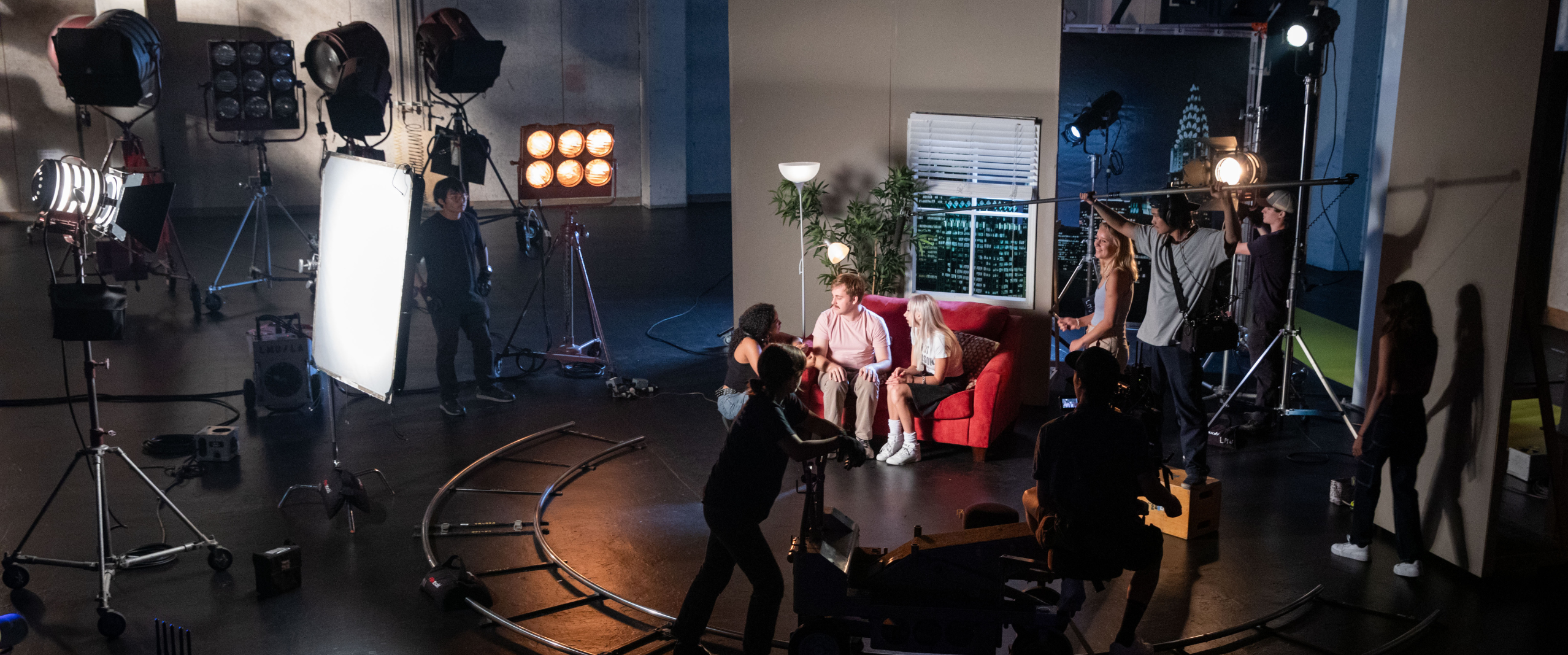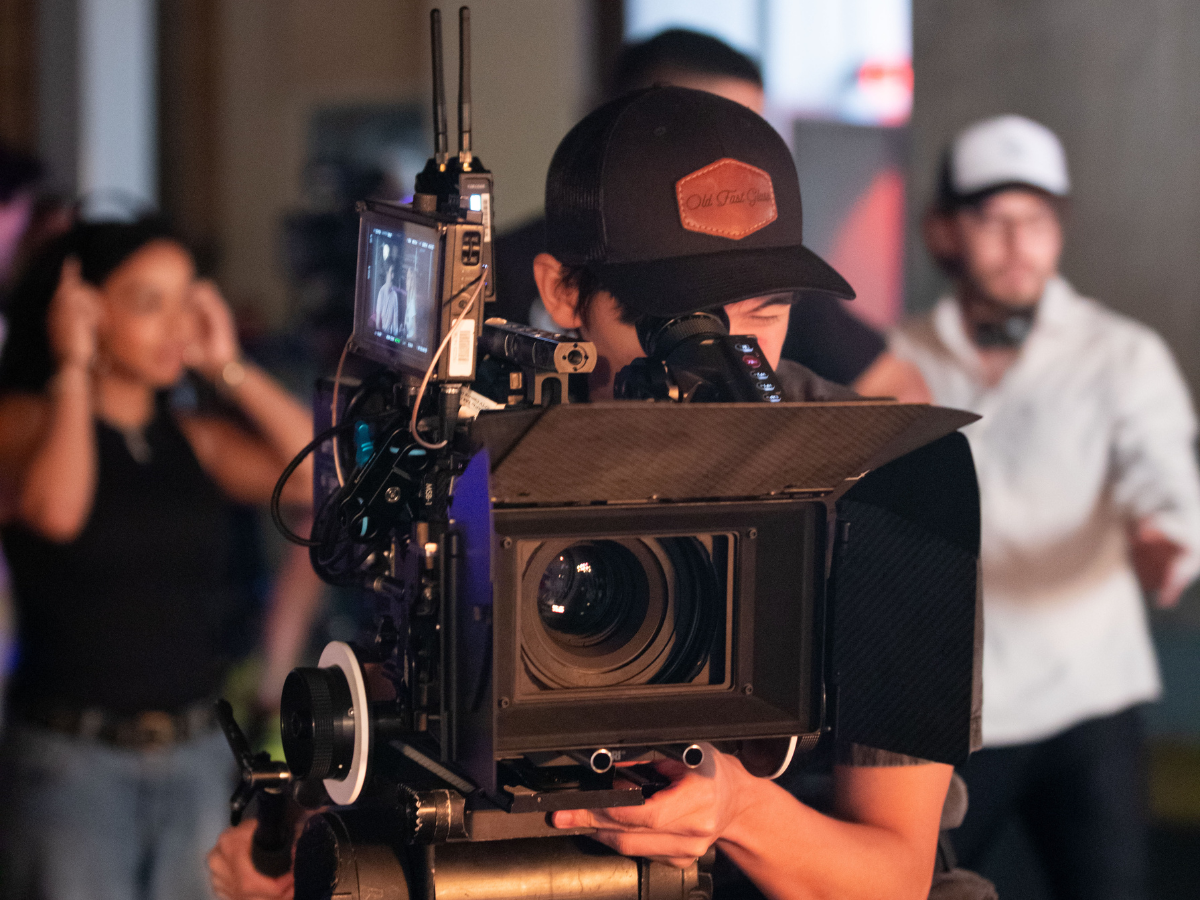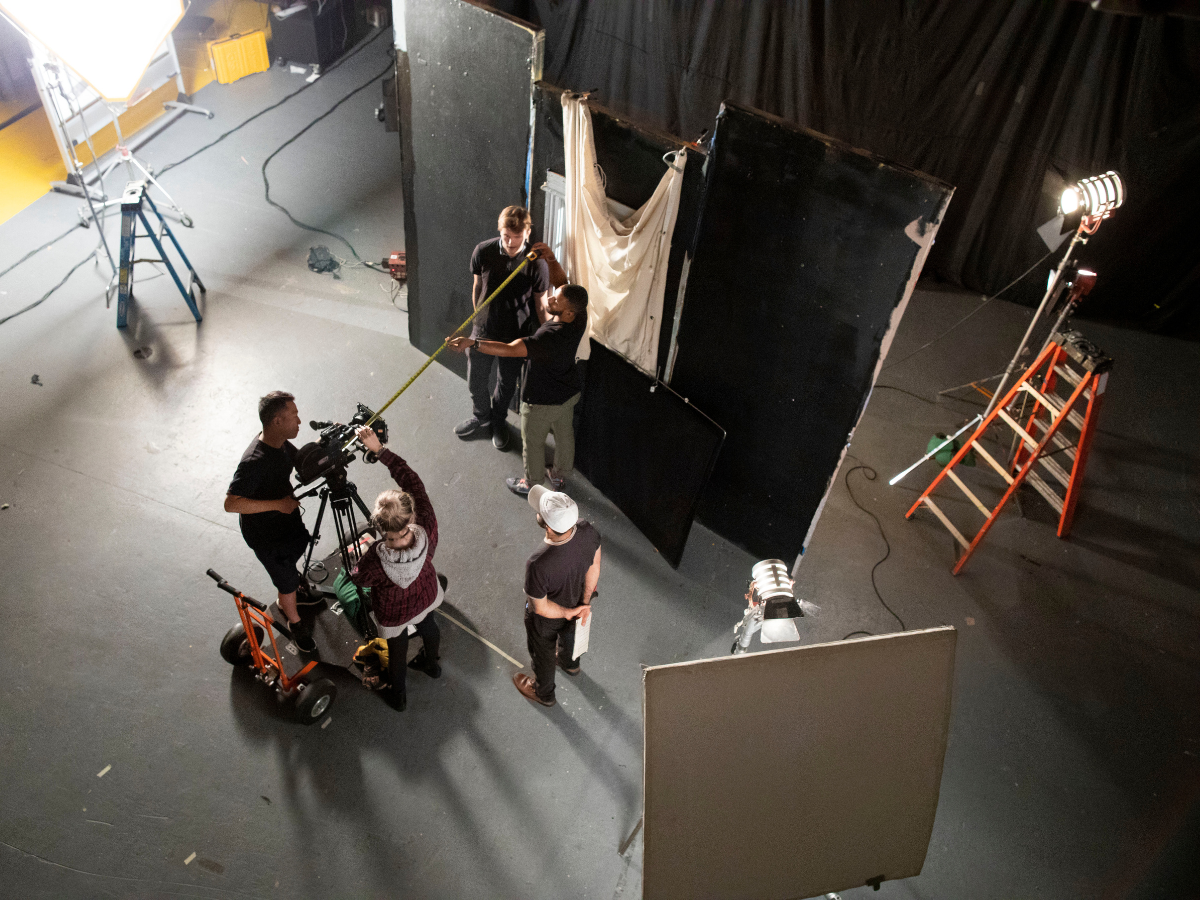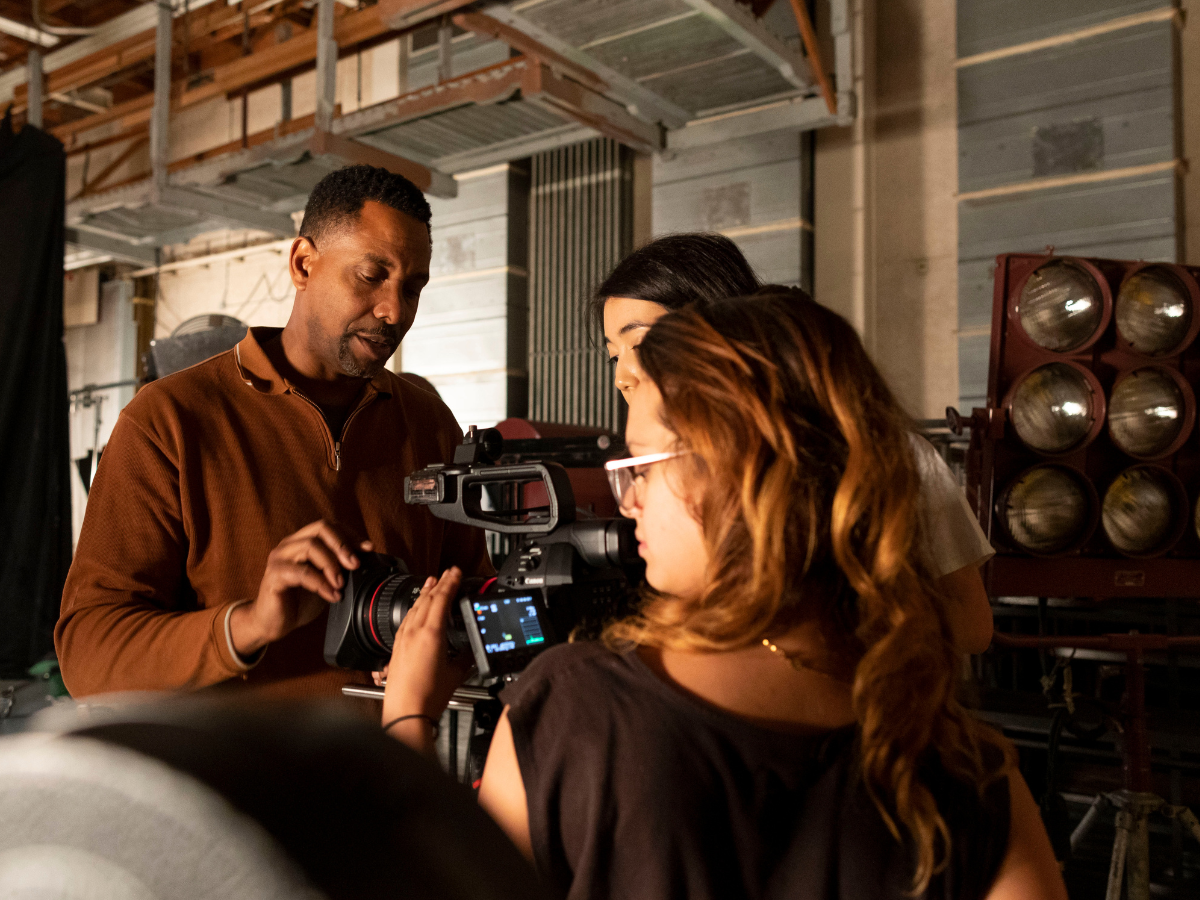
Film and Television Production
The Film and Television Production MFA program prepares students to express their stories on a variety of screen formats. Students cultivate their artistic voices while mastering the practical aspects of mounting a production, from writing and directing to budgeting and post-production. All students direct two short films in their initial three semesters. Towards the completion of their third semester, students choose one of five specializations: directing fiction, directing non-fiction, creative producing, cinematography, or editing. They then receive advanced instruction and tailor their thesis film and/or other deliverables to their chosen specialization. SFTV students own the rights to their films which allows them to submit to film festivals and distribute as they desire.
Alumni include Daniel McDonald ‘17 who has worked on Cheer and Last Chance U. In 2020, McDonald won an Emmy for Outstanding Picture Editing for an Unstructured Reality Program for his work on Cheer.

Message from the Program Director
– Michael Kang, Production Professor and Graduate Director of Film and Television Production
Course Requirements
-
Fall Semester
- PROD 500 - Directing the Short Film I: Vision and Exploration
- PROD 541 - Intro to Cinematography
- PROD 566 - Intro to Post-Production
- SCWR 501 - Fundamentals of Cinematic Storytelling
Spring Semester
- PROD 530 - Intermediate Documentary Pre-Production or
SCWR 530 - Screenwriting for Intermediate Production - PROD 550 - Directing the Short Film II: Visual Storytelling
- PROD 570 - Production Planning
- RECA 500 - Sound for Production
-
Fall Semester
- PROD 600 - Directing the Short Film III: Directing Actors (6 units)
- RECA 567 - Seminar in Sound
Spring Semester
Students declare one of the following specializations.
Creative Producing:
- PROD 633 - Developing, Selling, & Monetizing Digital Content
- PROD 639 - Producing Master Class
- FTVS 513 - Seminar in American Film
- IFTV 6100 - Intern Practicum (zero units)
Directing Fiction:
- FTVS 513 - Seminar in American Film
- SCRW 620 - Writing the Narrative Production Thesis
- IFTV 6100 - Intern Practicum (zero units)
- Advanced Elective - Students choose the first of three advanced elective courses in Directing Fiction:
- PROD 633 – Developing, Selling & Monetizing Digital Content
- PROD 635: Film & TV Devel (Spring only)
- PROD 639: Producing Master Class
- PROD 642: Intermediate Cinematography (Spring only)
- PROD 664: Visual Effects (Spring only)
- PROD 666: Advanced Editing
- PROD 680: Music Video Production (Fall only)
- PROD 680: Advanced Directing Seminar
- PROD 685: Visual Design (Summer only)
- PROD 685: Editing/Finishing Short (Spring only)
- PROD 685: DIT Workshop (*note only 1 unit)
- PROD 685: Post Prod Supervisor Workshop (*note only 2 credits, spring only)
- PROD 685: Seminar in Directing
- PROD 687: Working with Actors
- PROD 688: Directing the Camera (Spring only)
- SCWR 551: Feature Screenwriting
- SCWR 554: TV Writers Room
- SCWR 660: Writing the Spec Drama
- SCWR 670: Writing the Spec Comedy
- Any other 3-units of Advanced Electives (AE) that are pre-approved by the coordinator
Directing Non-Fiction:
- FTVS 513 - Seminar in American Film
- PROD 626 - Pre-production for Documentary Thesis
- IFTV 6100 - Intern Practicum (zero units)
- Advanced Elective - Students choose the first of three advanced elective courses in Directing Non-Fiction:
- PROD 633 – Developing, Selling & Monetizing Digital Content
- PROD 635: Film & TV Devel (Spring only)
- PROD 639: Producing Master Class
- PROD 642: Intermediate Cinematography (Spring only)
- PROD 664: Visual Effects (Spring only)
- PROD 666: Advanced Editing
- PROD 680: Music Video Production (Fall only)
- PROD 680: Advanced Directing Seminar
- PROD 685: Visual Design (Summer only)
- PROD 685: Editing/Finishing Short (Spring only)
- PROD 685: DIT Workshop (*note only 1 unit)
- PROD 685: Post Prod Supervisor Workshop (*note only 2 credits, spring only)
- PROD 685: Seminar in Directing
- PROD 687: Working with Actors
- PROD 688: Directing the Camera (Spring only)
- SCWR 554: TV Writers Room
- SCWR 660: Writing the Spec Drama
- SCWR 670: Writing the Spec Comedy
- Any other 3-units of Advanced Electives (AE) that are pre-approved by the coordinator
Cinematography:
- PROD 642 - Intermediate Cinematography
- PROD 567 - Color Correction
- FTVS 513 - Seminar in American Film
- IFTV 6100 - Intern Practicum (zero units)
Editing:
- FTVS 513 - Seminar in American Film
- IFTV 6100 - Intern Practicum (zero units)
- Advanced Elective - Six units selected from the following:
- RECA 568 - Advanced Post-Production Sound
- PROD 664 - Visual Effects
- PROD 642 - Intermediate Cinematography
- PROD 567 - Color Correction
- PROD 685 - DIT Workshop (1 unit)
- PROD 685 - Post-Production Supervisor Workshop (2 units)
-
Fall Semester
Creative Producing
- SCWR 685 - Entertainment Business Affairs
- FTVS 514 - Seminar in International Film
- Advanced Elective - Select from the following:
- SCWR 551 - Seminar in Feature Writing
- PROD 635 - Film & TV Development
- SCWR 554 - Writers Room
- SCWR 660 - Writing the Spec Drama
- SCWR 670 - Writing the Spec Comedy
- Others by permission of Coordinator
Directing Fiction
- PROD 650 - Thesis Production
- FTVS 514 - Seminar in International Film
- Advanced Elective
Directing Non-Fiction
- PROD 650 - Thesis Production
- FTVS 514 - Seminar in International Film
- Advanced Elective
Cinematography
- PROD 649 - Advanced Cinematography
- FTVS 514 - Seminar in International Film
- Advanced Elective - Students choose the first of three advanced elective courses in Cinematography:
- PROD 688 - Directing the Camera (Spring Only)
- PROD 685 - Music Video Production (Fall Only)
- PROD 685 - Visual Design (Summer Only)
- PROD 666 - Advanced Editing
- PROD 685 - DIT Workshop (*1 unit only)
- PROD 685 - Post Production Supervisor Workshop (*2 units only)
Editing
- PROD 666 - Advanced Editing
- FTVS 514 - Seminar in International Film
- Advanced Elective
Spring Semester
Creative Producing
- PROD 675 - Thesis Portfolio
- Advanced Elective - See Above
- FTVS Elective - Any 500 or 600-level FTVS course
Directing Film
- PROD 670 - Thesis Post-Production
- Advanced Elective - Select from the list above
- FTVS Elective - Any 500 or 600-level FTVS course
Directing Non-Fiction
- PROD 670 - Thesis Post-Production
- Advanced Elective - Select from the list above
- FTVS Elective - Any 500 or 600-level FTVS course
Cinematography
- PROD 675 - Thesis Portfolio
- Advanced Elective - Select from the list above
- FTVS Elective - Any 500 or 600-level FTVS course
Editing
- PROD 675 - Thesis Portfolio
- PROD 685 - Editing and Finishing the Short Film
- FTVS Elective - Any 500 or 600-level FTVS course
-
Creative Producing
Students will graduate with a portfolio that includes one fully developed proposal for a feature film or television show that includes a detailed project bible, look book, a business marketing strategy, and pitch presentation as well as a rip/tone reel or visual sales tool. Additionally, students will develop a web series idea composed of either a written treatment and visual pitch or a completed digital proof of concept (POC). Students also produce 25-60 minutes of content from two separate films directed by other students, including reflection papers on the process.
Directing Fiction
Students will graduate with a portfolio consisting of three films they have directed, including an 8-to-15-minute fiction thesis film. The portfolio will also include promotional materials and a plan for pitching their thesis film to festivals.
Directing Non-Fiction
Students will graduate with a portfolio of three films, including an 8-to-20-minute thesis documentary that they have directed. The portfolio will also include promotional materials and a plan for pitching their thesis film to festivals.
Cinematography
Cinematographers will collaborate closely with MFA directing candidates to help them realize their creative visions for projects. Upon completion of the program, these students will have a portfolio of work to show to prospective employers that includes a personal marketing package with a 2-4-minute cinematography demo reel, an online portfolio/website, and links to 25-60 minutes of content from three or more thesis or capstone films that they have shot.
Editing
Editing specializers will collaborate closely with other MFA candidates at SFTV serving as principal editors on their projects. Upon completion of the program, each editing specializer will have a portfolio of work to show to prospective employers that includes a demo reel, an online portfolio/website, trailers for completed films, 25-60 minutes of edited content from at least two graduate thesis films and schedules, budgets, and workflow outlines for each project.



